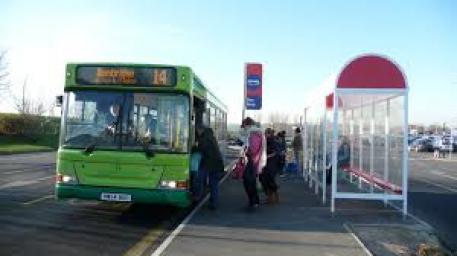Changing Transportation Routes
Every day before we go to school, our mother has to leave. She has to walk twelve blocks to get to the bus stop. Then she takes the bus to work. She is a commuter. But some days it is raining or sn
owing. We really think it’s terrible that there isn’t a bus that comes closer to our street.
At school, we learned about the city tran sit system. It includes buses, trains, and even trolleys. It is a public system. We have to pay for the rides, but the government pays a lot, too. The government ge
ts its money from taxes. If you own your own car and drive to places, then you use private transportation.
I said to my mother, “We pay taxes. This is a public transportation system. It is
our system. It should come closer to our home. I do not want you to have to walk so
far to get to the bus.”
She agreed that would be great. But she said it would take more than one family to get the bus line to change. I said I would ask my teacher about it. We could do a study and maybe get a petition.
Our teacher had told us about service learning. That is a way of learning when you study something, learn something, and help make your community better. I thought that having the bus be
more available to us would be a great way to do service learning.
My teacher liked the idea. He talked with the principal. They said we could do the study. So our class surveyed all our parents. How many of them had to walk how many blocks to the bus stop, we asked.
How many would use the bus more if it was easier to get to.
We collected our survey data. Then we made a table. We found that 90% of all the parents would use the bus more if it was easier to get to. We also found that only 20% of the parents could get to it easily, just by walking five blocks. For all the others, it took between six and 12 blocks. My moth
er was one of the people with the longest walks to the bus.
We made a map. We showed how the bus route could be changed to reach people better in our community. We showed where it could stop. We looked at corners to make sure the bus could turn on different blocks. Then my teacher called the alderman. He asked the alderman if we could meet to talk about our study.
We met with the alderman. She was impressed. She said we had done a really good job of figuring out the problem and a solution. She promised she would talk with the head of the transportation system about it.
We thought that something would happen quickly, but it didn’t. Just when we were giving up, our teac
her got a call. It was from the transportation office. They said we were getting the change we asked for.
Now my mother only has to walk four blocks to get to the bus. So she can leave later. When she leaves in the morning, if it is raining of snowing, she always says, “I am so glad you got the bus route changed.”
